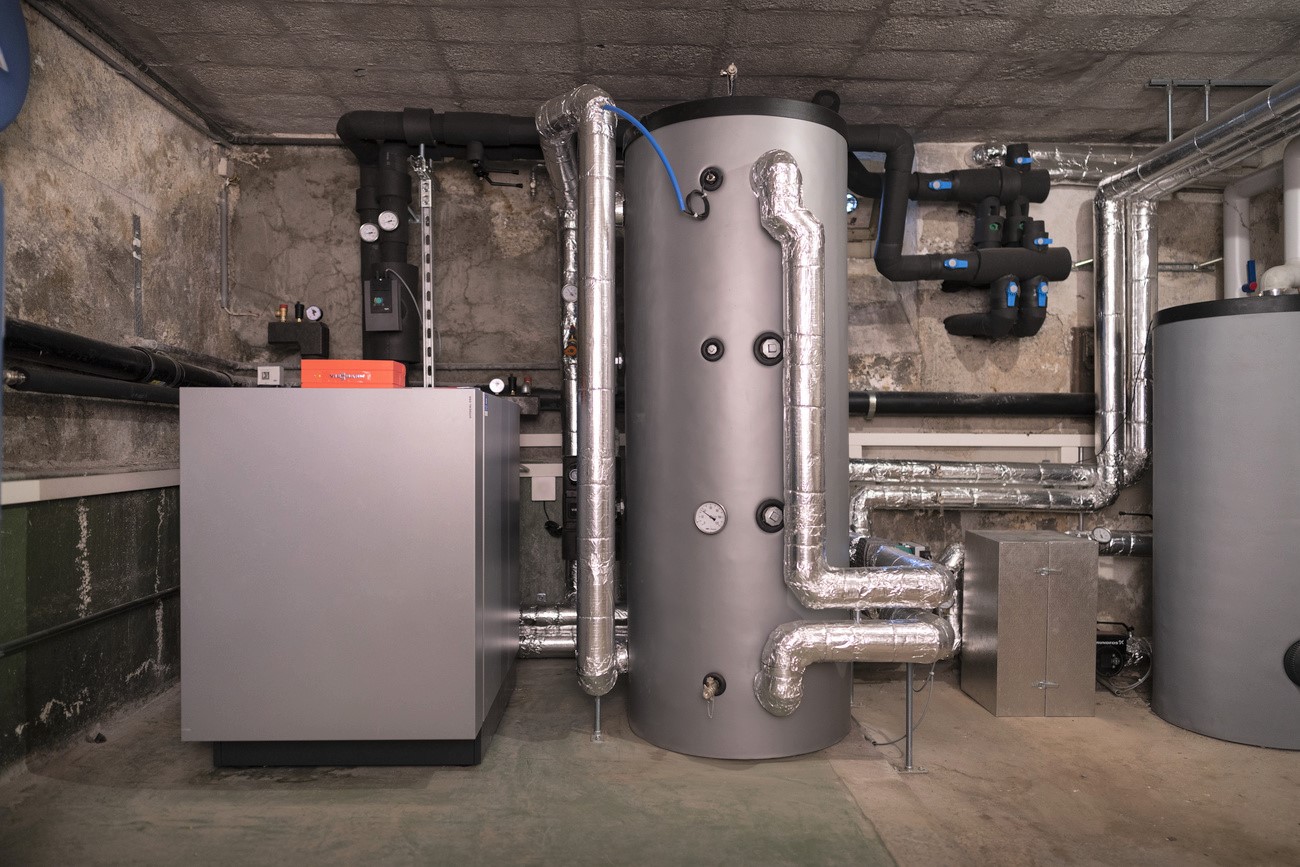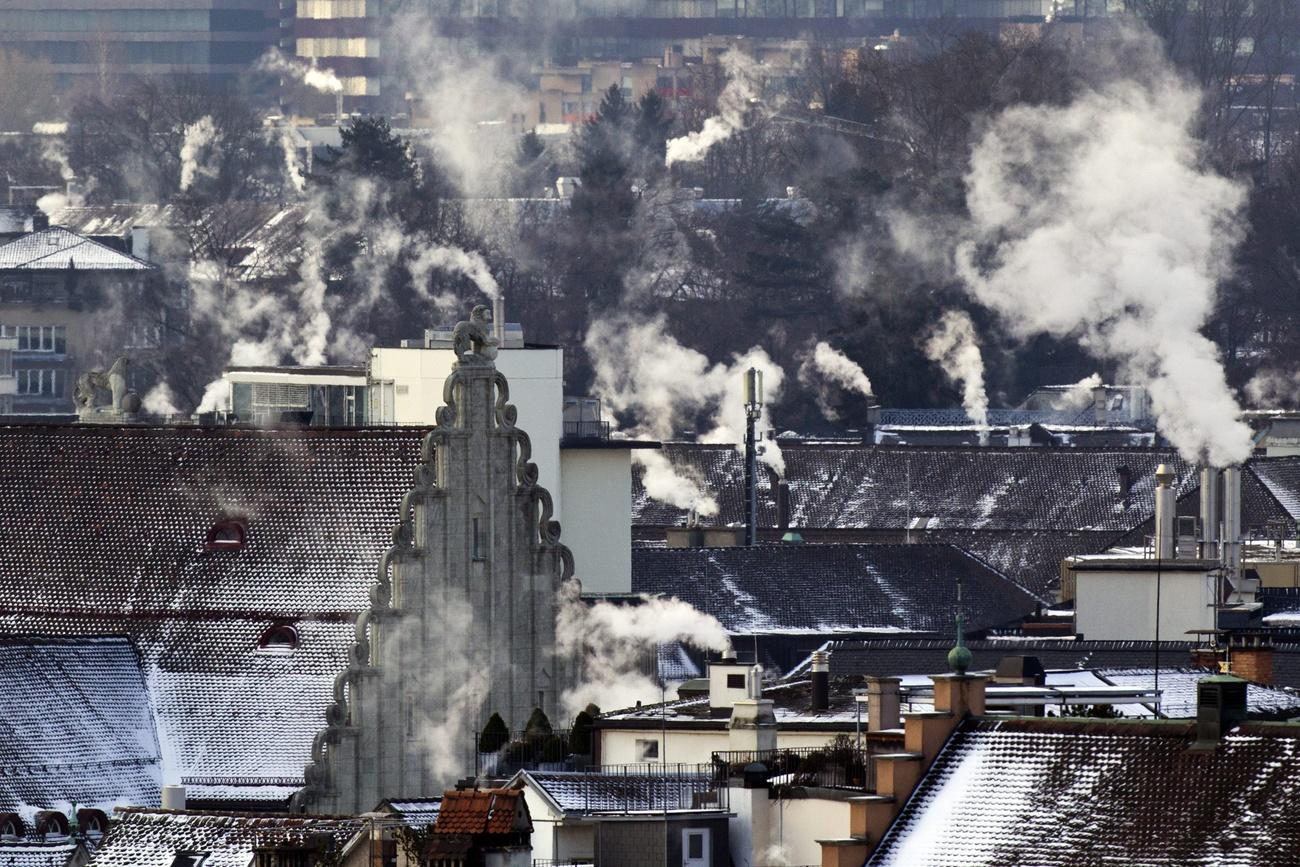More heat pumps and less oil: how the Swiss heat their homes

The percentage of homes equipped with a heat pump in Switzerland is higher than the European average. Fossil fuel use is declining, but oil continues to heat more than one in three buildings, one of the highest shares on the continent.
The energy transition is making its way into Swiss people’s homes. The proportion of residential buildings in Switzerland equipped with a heat pump has increased fivefold since 2000 to reach 21% last year, according to the latest dataExternal link from the Federal Statistical Office (FSO). The share rises to 75% for properties built in the past decade.
The situation is slightly different for households: in 2023, 18% had installed a heat pump. The use of this heating system in Switzerland is higher than the average of the countries surveyed by the European Heat Pump Association (EHPA).

More
Newsletters
A heat pump extracts thermal energy from the air, water or ground and uses it to heat a building. If the electricity that powers it is of renewable origin, the heat pump is a sustainable heating system because it generates no CO2 emissions, unlike a gas or oil boiler.
Scandinavian states have the highest number of heat pumps installed per 1,000 households. Below the European average are countries around the Mediterranean with hotter climates – but also nations with more temperate climates such as Germany and the United Kingdom.
Rise of heat pumps after Russian invasion of Ukraine
The need to decarbonise the building sector to meet international climate goals has encouraged the spread of heat pumps. In more than 30 countries, including Switzerland, the state offers financial incentives for their installation or for other sustainable heating systems. Buildings, and in particular the consumption of fossil fuels for space heating and hot water production, account for about 10% of global CO2 emissionsExternal link (22% in Switzerland).
+ Can heat pumps solve the climate crisis? Can they also cripple the Russian economy?
In 2022 the invasion of Ukraine by Russia and the decision of many European countries to reduce their energy reliance on Russia contributed to a strong rise in sales of heat pumps. Sales in 2022 increased by 40% in Europe and nearly 25% in Switzerland compared with 2021.
The end of the heat pump boom
The spike was short-lived. In 2023 sales dropped for the first time after a decade of growth. The decline continued into 2024 with sales dropping 47% in the first half, EHPA indicatedExternal link in September.
The lack of qualified personnel to install heat pumps and the relatively high price of electricity compared to gas are among the reasons for the reversal, according to the organisation. Some countries, for example France, Europe’s largest market for heat pumps, have also reduced funding for programmes to support the energy transition.
2024 will not be a good year in Switzerland either, predicts Philippe Ranc of the Swiss Heat Pump Professional Association. Sales dropped 38% in the first six months.
The sense of urgency and the intention to get rid of fossil-fuelled heating systems after the Russian invasion of Ukraine have somewhat faded, Ranc notes. What’s more, he adds, the ability to travel again after the Covid pandemic means many households prefer to spend on holidays rather than on upgrading their home.
The fact that the demand for heat pumps has subsided is not, however, negative, Ranc believes. “The heat pump is not the solution for every home. It makes no sense to install one in a poorly insulated building: it would not be effective.” Other energy efficient solutions include district heating and pellet boilers.
“Heat pumps will continue to spread, but with less vigour,” he says.
Oil in more than a third of buildings in Switzerland
However, the advance of heat pumps does not prevent fossil fuels from remaining the main source of heating energy in Switzerland. More than one in three buildings (37%) is equipped with an oil boiler and about one in six (17%) is heated with gas.
The percentage of buildings with an oil heating system in Switzerland has been steadily declining for 40 years. Nevertheless, it is among the highest in Europe.
The reasons are historical and financial. In Switzerland, the rooms formerly used to store coal, found in virtually every building, lend themselves perfectly to the installation of an oil boiler or gas tank.
Today, fossil fuels systems are still attractive, mainly because of their price and the relatively low replacement rate, Mohamed Meghari of the department of energy of canton Vaud told Swiss public broadcaster, RTS.
The initial investment for an oil boiler is about CHF20,000 ($23,000). A heat pump requires at least CHF10,000 more, in addition to the cost of insulating the building. Many homeowners thus prefer to replace an old fossil fuel boiler with a system of the same type.
+ Why most Swiss buildings are environmentally inefficient
There is no obligation in Switzerland to replace fossil fuel heating systems. However, in an increasing number of cantons, homeowners must install a device powered by renewable sources if they renovate their homes.
This means that in the coming years, the Swiss population will be expected to reduce significantly the use of oil and gas to heat their homes. The federal government’s goal is to achieve net-zero carbon emissions for buildings by 2050.
Edited by Virginie Mangin/ts

In compliance with the JTI standards
More: SWI swissinfo.ch certified by the Journalism Trust Initiative











You can find an overview of ongoing debates with our journalists here . Please join us!
If you want to start a conversation about a topic raised in this article or want to report factual errors, email us at english@swissinfo.ch.